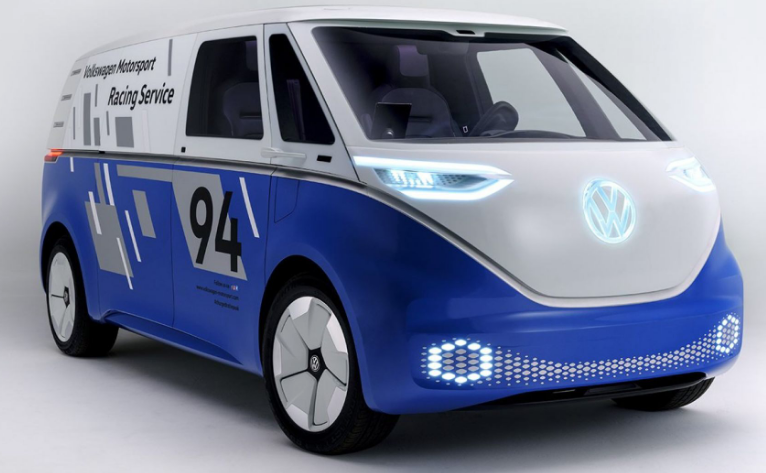One of the stars of AutoMobility LA at the LA Auto Show has been the I.D. Buzz Cargo concept, which ties into Volkswagen’s traditional Transporter cargo van and the look of  its retro-passenger microbus. It’s the largest vehicle to be built on the German automaker’s Modular Electric Drive Kit (MEB) platform, and it will be getting an expanded version of the microbus with a large rear cargo area in lieu of seats. It will also get a battery pack capable of going 340 miles on a charge. On the other side of the urban mobility scale, the company unveiled the Cargo e-Bike, a three-wheeled, battery-assisted electric bike that it says can deliver cargo up to 463 pounds. It’s expected to enter production in 2019.
its retro-passenger microbus. It’s the largest vehicle to be built on the German automaker’s Modular Electric Drive Kit (MEB) platform, and it will be getting an expanded version of the microbus with a large rear cargo area in lieu of seats. It will also get a battery pack capable of going 340 miles on a charge. On the other side of the urban mobility scale, the company unveiled the Cargo e-Bike, a three-wheeled, battery-assisted electric bike that it says can deliver cargo up to 463 pounds. It’s expected to enter production in 2019.
Another LA Auto Show highlight: While the Toyota Corolla has been on the market for 53 years, the 2020 Corolla will be the first-ever to come in a hybrid edition. It’s expected to achieve more than 50 miles per gallon and will be loaded with Toyota’s standard suite of safety equipment, Toyota Safety Sense. The Japanese automaker also announced that the Prius will be getting the all-wheel-drive equipped AWD-e, that will provide additional traction through various conditions like inclement weather, snow or rain, and an estimated 52 mpg in the city. Toyota also had other product announcements during the show.
Nissan is tapping into the ecosystem and energy grid through two new programs, one out of Japan and one announced at its U.S. headquarters. The Yokohama global HQ announced Nissan Energy, where owners of Nissan electric vehicles will be able to easily connect the EV to energy systems to charge their batteries, power their homes and businesses, and feed energy back into the power grid. It will also develop new ways to reuse electric car batteries. The company is working with partners such as electric and telecom companies, conducting field tests of vehicle-to-grid and virtual power plant systems to tap into the clean energy benefits. In Franklin, Tenn., the U.S. division announced a program built around Nissan EV owners saving on electric utility costs by tapping into energy already stored in their Nissan Leaf. Working with Fermata Energy, a vehicle-to-grid systems company, Nissan North America is launching a new pilot program under the Nissan Energy Share initiative. It taps into bi‑directional EV charging technology to partially power its North American headquarters in Franklin, and its design center in San Diego, Calif. Bi-direction charging technology not only charges the Nissan Leaf, it also stories energy in the car’s battery pack to partially power external electrical loads, such as buildings and homes.
Electric scooter company Bird is offering independent operators a way to get into the mobility business. Bird is selling the scooters to local business people and getting 20% of each ride. They also get access to Bird’s chargers and mechanics, but they do have the option of charging the scooters themselves. A number of cities do regulate the number of scooters they’ll permit to run on their streets. Called the Bird Platform, the company will begin rolling out the franchisee program in December in markets where city regulators have been more relaxed about it. Municipal governments have mixed feelings about whether they should allow Bird and and its competitor, Lime, to have free rein in their cities, or if they should be limited in number of scooters allowed on their streets; as has been the case in San Francisco. Bird and Lime believe in the “micro-mobility solution,” where electric scooters will be a solution to increasing traffic congestion and an alternative to ride-sharing options like Uber and Lyft. They usually enter markets first by showing up and gaining ridership before working things out with the city; and that sometimes happens after the city initiatives regulations and forces the issue.
Ryder System has ordered 1,000 medium-duty electric panel vans from Chanje, which will be operated by FedEx Express pick-up and delivery services. FedEx is purchasing 100 vehicles and leasing the other 900; the fleet vehicles are expected to operate throughout California over the next two years. The Chanje electric van is equipped to haul up to 6,000 pounds, up to 675 cubic feet of cargo, and travel 150-miles of range on a single charge.
Vincentric announced the 2018 U.S. Hybrid Analysis results with 42 of the 79 hybrids evaluated (53%) having a lower total cost of ownership compared to their closest all-gasoline powered counterpart. It was a significant growth rate over the 2017 study, where about 40% of the hybrids analyzed were cost-effective. The Ford Fusion Hybrid Titanium had the highest savings, where buyers could save close to $6,400 over five years of ownership compared to the similarly equipped all-gasoline powered version. “The number of cost-effective hybrids has increased significantly from last year’s analysis,” said Vincentric President, David Wurster. “Our research shows that the lower hybrid costs for fuel and maintenance now gives buyers a larger variety of cost-effective, eco-friendly vehicles to choose from.”



